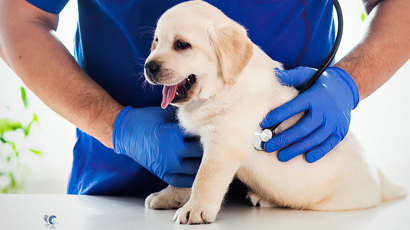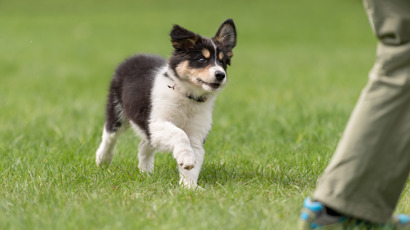The importance of routine in your dog’s life

Not unlike humans, dogs feel happier and more settled with a healthy routine in place. But why is that? Read on to find out why a good routine is a crucial factor in your dog’s overall happiness and what to do when it suddenly has to change.
Setting up a good routine
Much the same as with us humans, when our four-legged friends are completely aware and able to manage the world around them, they’re much more likely to be relaxed and content.
“The goal with our pet dogs is to give them a happy life, ensuring that they feel safe, settled and comfortable at their core,” says Sydney-based dog behaviourist Ian Shivers.
“Whether it's a designated sleeping location, meal-times or simply consistent communication patterns, the more practised and familiar your dog is with it, the more likely they’re going to feel better about doing it.”
Your routine should also include a set time for ‘walkies’, for example, either before or after work (or ideally both), and some undisrupted playtime throughout the day, especially if you work from home.
Just like exercise, some designated ‘me-time’ is also important for your dog’s mental health. This helps ensure your pet isn’t overstimulated, which can cause stress, anxiety and unrest. So, if you find yourself spending more time at home than you usually would, be sure to give them sufficient space.
Coping with changes
Of course, any good routine can occasionally slip or even shift permanently due to unforeseen circumstances, so how can we prepare our dogs for change? Ian recommends introducing some variables into their daily lives as part of their routine. This could include leaving them alone, in a comfortable setting some evenings, so they don't panic when you do go out for dinner or stay out late on the odd occasion. This can help dogs develop their coping skills and more resilience towards change. Taking slightly different routes while out on walks can help achieve the same.
It’s all about creating balance: providing security when it comes to core resources while building up a tolerance to change at their pace, not yours, to help set them up for stress-free success.
The importance of a good feeding routine
“There is a lot of research on the relationship between gut health and mental health,” Ian explains. “We know the gut produces serotonin, the chemical nicknamed the ‘happy chemical’ because it contributes to wellbeing and happiness.”
This is one of many reasons why a good feeding routine and nutrition are important factors in your dog’s health and happiness. Remember that, when, and how they eat is just as important as what they eat. Just think about your own habits. If we eat too late or skip a meal, we likely find ourselves lacking in energy throughout the day and snacking more. Of course, dogs can’t tell you how they’re feeling, but you can usually tell if anything is amiss by assessing their stools. If they're inconsistent or if your dog is unusually gassy, chances are, something’s off.
You can learn more about this here, contact Black Hawk for advice or speak with your local vet if you have any concerns.
Making the most of your dog’s mealtime
Eating at the same time each day not only has health benefits, but it can also be a good time to engage your dog.
“All species naturally expend energy and effort in finding and consuming food. But we take that option away from our dogs when we simply serve them their dinner in a bowl twice a day,” Ian says.
He suggests two things we can do to increase the value of mealtime: “We can make it about them getting rewarded for engaging with us: using the dog’s food as a reward for completing desired behaviours. The other way we can do it is to create food puzzles for our dogs to problem solve. ‘Activity feeding’ can be really stimulating for them”
Think about striking a balance between these two practices, and using the one that benefits you and your dog most. For example, if your dog seems highly reliant on human affection, you could use mealtimes to build its confidence with independent problem-solving, so go for the food-puzzle approach. On the other hand, if your dog could benefit from more lesson-times, try using food as an opportunity to train, without exceeding their daily food intake.
A healthy, predictable routine is a vital part of a dog’s life, however, there’s no need to be so rigid that maintaining a schedule becomes a job in itself. Like most things in life, it’s all about balance.


